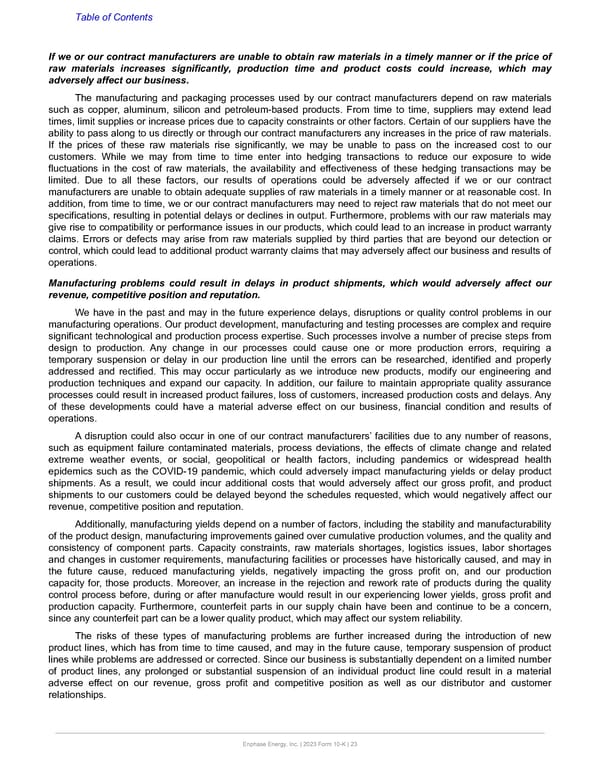Table of Contents If we or our contract manufacturers are unable to obtain raw materials in a timely manner or if the price of raw materials increases significantly, production time and product costs could increase, which may adversely affect our business. The manufacturing and packaging processes used by our contract manufacturers depend on raw materials such as copper, aluminum, silicon and petroleum-based products. From time to time, suppliers may extend lead times, limit supplies or increase prices due to capacity constraints or other factors. Certain of our suppliers have the ability to pass along to us directly or through our contract manufacturers any increases in the price of raw materials. If the prices of these raw materials rise significantly, we may be unable to pass on the increased cost to our customers. While we may from time to time enter into hedging transactions to reduce our exposure to wide fluctuations in the cost of raw materials, the availability and effectiveness of these hedging transactions may be limited. Due to all these factors, our results of operations could be adversely affected if we or our contract manufacturers are unable to obtain adequate supplies of raw materials in a timely manner or at reasonable cost. In addition, from time to time, we or our contract manufacturers may need to reject raw materials that do not meet our specifications, resulting in potential delays or declines in output. Furthermore, problems with our raw materials may give rise to compatibility or performance issues in our products, which could lead to an increase in product warranty claims. Errors or defects may arise from raw materials supplied by third parties that are beyond our detection or control, which could lead to additional product warranty claims that may adversely affect our business and results of operations. Manufacturing problems could result in delays in product shipments, which would adversely affect our revenue, competitive position and reputation. We have in the past and may in the future experience delays, disruptions or quality control problems in our manufacturing operations. Our product development, manufacturing and testing processes are complex and require significant technological and production process expertise. Such processes involve a number of precise steps from design to production. Any change in our processes could cause one or more production errors, requiring a temporary suspension or delay in our production line until the errors can be researched, identified and properly addressed and rectified. This may occur particularly as we introduce new products, modify our engineering and production techniques and expand our capacity. In addition, our failure to maintain appropriate quality assurance processes could result in increased product failures, loss of customers, increased production costs and delays. Any of these developments could have a material adverse effect on our business, financial condition and results of operations. A disruption could also occur in one of our contract manufacturers’ facilities due to any number of reasons, such as equipment failure contaminated materials, process deviations, the effects of climate change and related extreme weather events, or social, geopolitical or health factors, including pandemics or widespread health epidemics such as the COVID-19 pandemic, which could adversely impact manufacturing yields or delay product shipments. As a result, we could incur additional costs that would adversely affect our gross profit, and product shipments to our customers could be delayed beyond the schedules requested, which would negatively affect our revenue, competitive position and reputation. Additionally, manufacturing yields depend on a number of factors, including the stability and manufacturability of the product design, manufacturing improvements gained over cumulative production volumes, and the quality and consistency of component parts. Capacity constraints, raw materials shortages, logistics issues, labor shortages and changes in customer requirements, manufacturing facilities or processes have historically caused, and may in the future cause, reduced manufacturing yields, negatively impacting the gross profit on, and our production capacity for, those products. Moreover, an increase in the rejection and rework rate of products during the quality control process before, during or after manufacture would result in our experiencing lower yields, gross profit and production capacity. Furthermore, counterfeit parts in our supply chain have been and continue to be a concern, since any counterfeit part can be a lower quality product, which may affect our system reliability. The risks of these types of manufacturing problems are further increased during the introduction of new product lines, which has from time to time caused, and may in the future cause, temporary suspension of product lines while problems are addressed or corrected. Since our business is substantially dependent on a limited number of product lines, any prolonged or substantial suspension of an individual product line could result in a material adverse effect on our revenue, gross profit and competitive position as well as our distributor and customer relationships. Enphase Energy, Inc. | 2023 Form 10-K | 23
 Annual Report Page 22 Page 24
Annual Report Page 22 Page 24